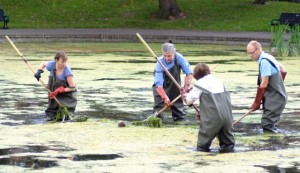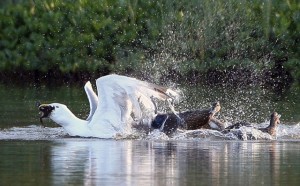Ducks – to feed or not to feed?
Posted Monday April 1, 2013
To Feed or not to Feed?
Feeding the ducks is a fun thing to do in the park. It is a thrill to get close to wild creatures. For some child, it may be the start of a lifelong interest in the nature world.
So what’s the problem?
Because there are only a few duck for the relatively large amounts of bread being offered, it is usually the Herring Gulls and Feral Pigeons, which turn up for the feast.
They then deposit a large amount of bird poo on the pond surround,which when it rains, gets washed into the water.
This accumulates during the winter and acts as a fertiliser so that when Spring arrives, the warmth and sunshine trigger a massive growth of floating Duckweed and Blanket weed.
Every spring and summer, Lindsay and her Tuesday pond volunteers, wade through the pond to remove as much as they can. The weed grows faster than they can remove it, super fuelled as it is by many kilos of bird poo.
Pond plants generally, are highly beneficial as they absorb nutrients and oxygenate the water.The problem comes when there is too much. If Lindsay and friends did not remove hundreds of kilos of it, the floating weed and algae would decay to form fermenting rafts which, as well as being unsightly, can lead to a catastrophic decline in water quality. Once oxygen levels drop, pond creatures die.
The natural foods of ducks and geese are seeds, grass, roots and pond plants. The RSPB and the Wildfowl trust recommend feeding seed and grain. Chopped green vegetables are, apparently, also good. Large quantities of white bread are especially bad for ducks, leading to poor condition and even wing deformities (RSPB)
The sight and sound of Herring Gulls forms an evocative backdrop to the British seaside experience. They are ‘Amber’ listed nationwide because of concern over decline.
However, regular feeding in the park has boosted their numbers to over two hundred at peak times.
It also leads them to associate humans with food so that they go on to make a serious nuisance of themselves around Mary’s cafe by stealing sandwiches from terrified toddlers.
They also take ducklings which may be why the wild Mallard deserted Queens Park Pond for five years before making their welcome return last year.
So please do not feed Herring Gulls especially on the pond surround. Please feed only small amounts of suitable food to Ducks and Geese.
Tell us what you think at: www.friendsofqueensparkbrighton.net or www.facebook.com/FriendsOfQueensParkBrighton or Twitter@FndsQueensPkBtn


